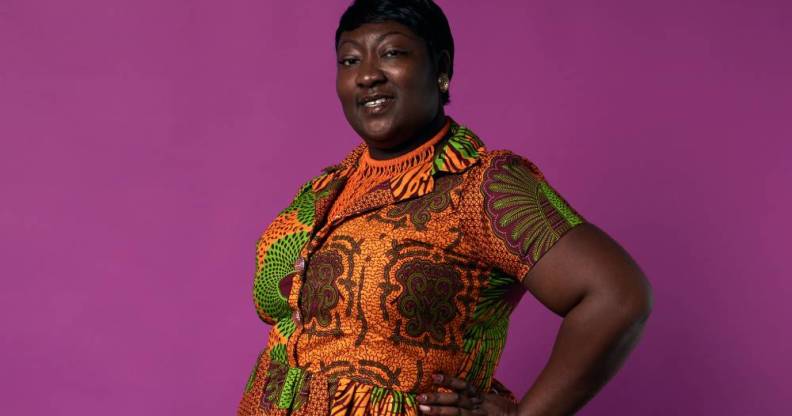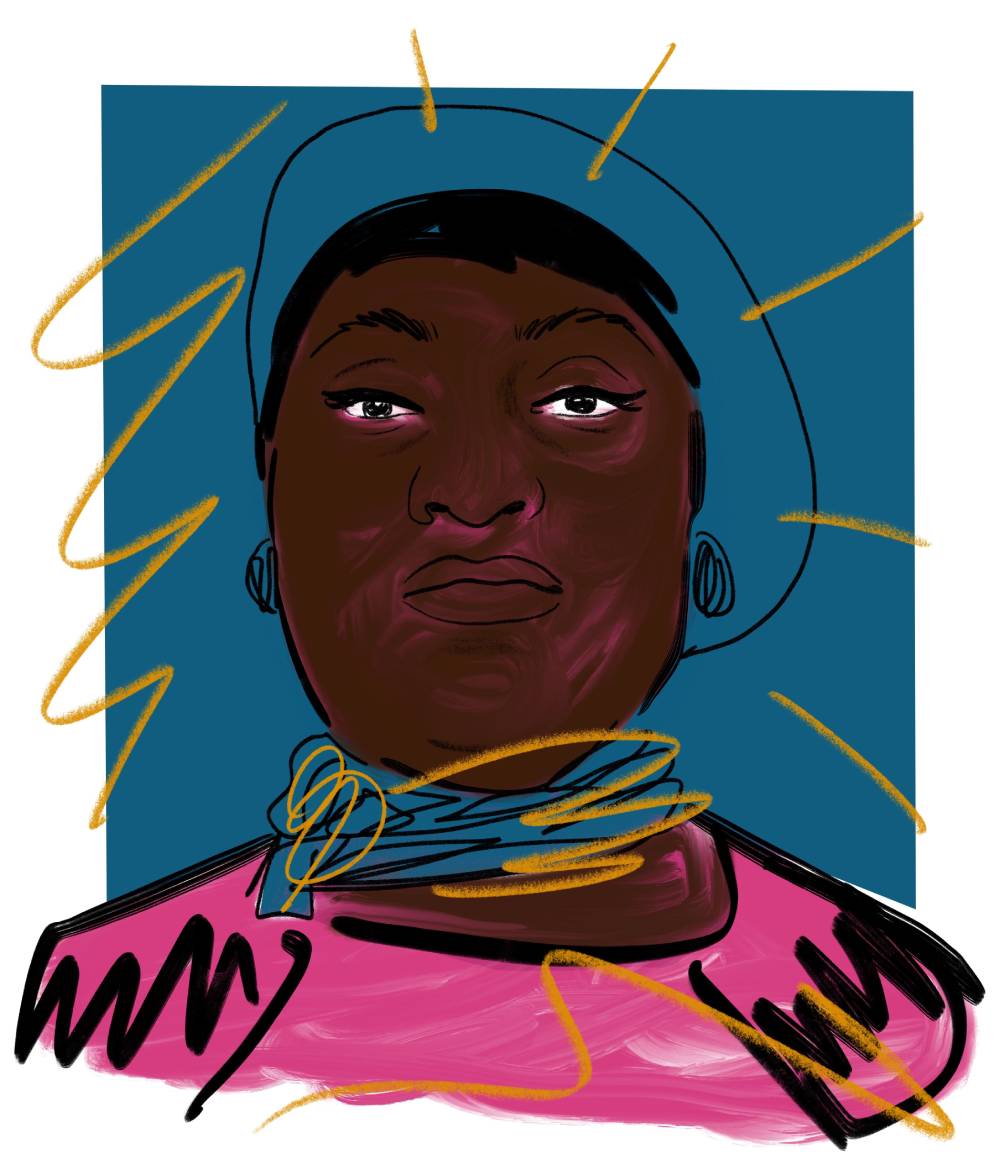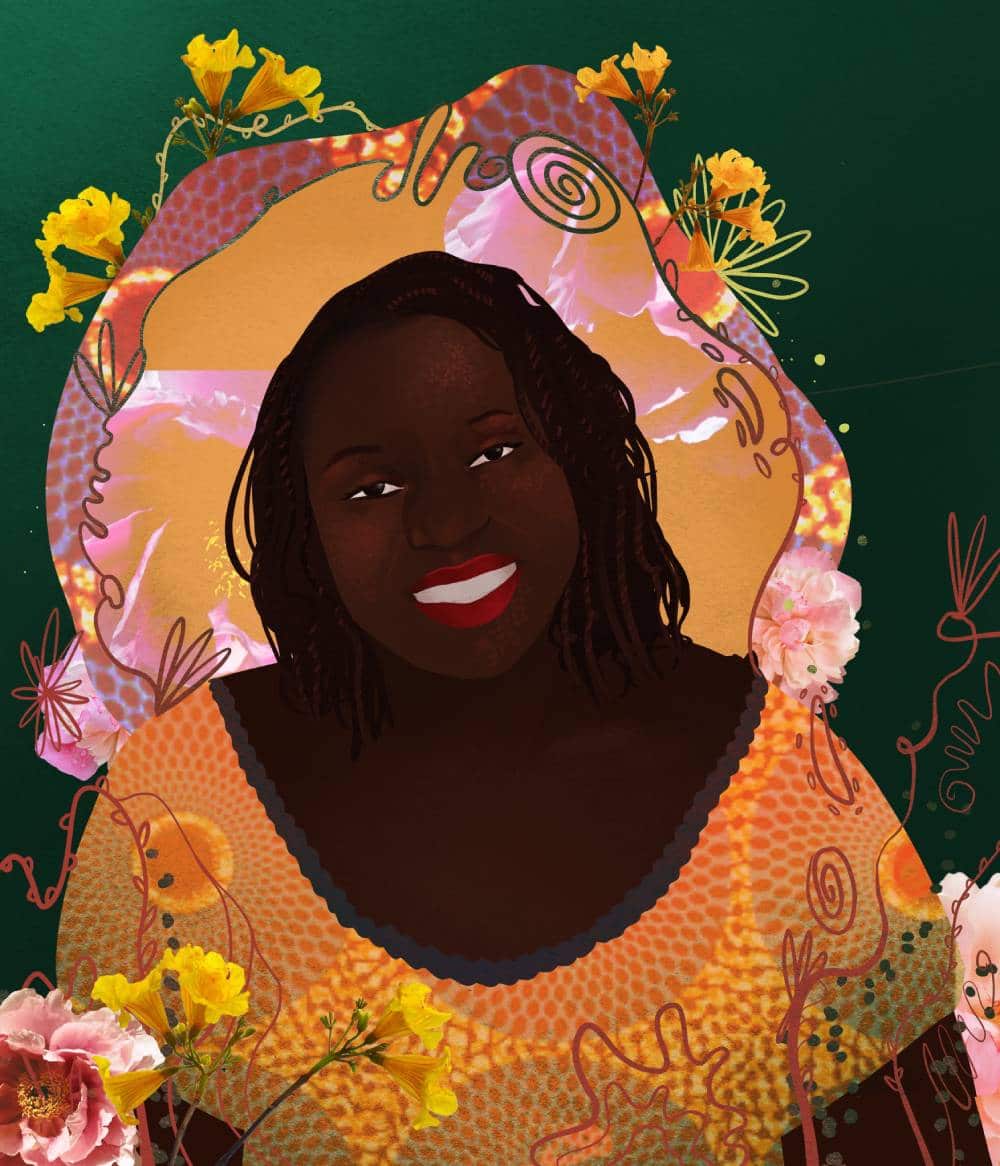Lady Phyll shares powerful story of the ‘Black, lesbian, warrior woman’ who changed her life for good, Moud Goba

Phyllis Akua Opoku-Gyimah (Lady Phyll) poses in the GAY TIMES Honours 500 studio on 21 November 2019 in London, England. (Photo by Gareth Cattermole/Getty Images for GAY TIMES)
In an extract from Jack Guinness’ new book, The Queer Bible, UK Black Pride co-founder Lady Phyll pays tribute to her the woman who “transformed her life”, LGBT+ activist Moud Goba
When I was younger, before I knew my purpose or my drive, my grandmother would watch me searching the night sky, as if for answers, or a sign. She’d remind me that up there our Ancestors play and scheme and connect, using the stars as chess pieces and our lives and our spirits as the connective tissue between generations, movements and time. And if the night sky was ever magical before then, it became so electric in its potential after.
It is this numinous wonder that I know connects me to people like me around the world. And not just like me – busy, tired, curious, determined – but Black, lesbian, warrior woman. For to who else does the night sky offer itself up as a spiritual or existential plunge pool? Who else can dive into the cool, expansive, foreverness of the night sky and feel themselves held, understood and comforted?
I think immediately of my sister, friend and comrade Moud Goba. She came, near-broken, to England many years ago and forever transformed my life. She was seeking asylum in the UK, escaping a life in Zimbabwe from which she deserved much more, and she encountered here, in a place that sells itself as some sort of bastion of freedom, democracy and equality, nothing but disbelief and doubt. She was treated as if she didn’t have a right to claim asylum, to pursue her human rights of freedom, happiness and safety.
Like me, she’s a Black African lesbian. She’s a mother, a sister, someone’s child. I could cry thinking about the first time we met and we embraced. It was her eyes more than anything that captivated me. The cosmos and everything the Ancestors fought for and believe in shine in her eyes.

A beautiful illustration of British political activist Phyll Opoku-Gyimah, also known as Lady Phyll. Lady Phyll is a co-founder of UK Black Pride and executive director of Kaleidoscope Trust. (Sam Russell Walker)
We became fast friends. I did what I could to help her asylum process along and to be for her what so many people had been for me: a strong, consistent, dependable and generous friend. There is something that we do as friends of people we see as our chosen family, ‘those in our communities’, where we buy things for yourself but not really needing them in the end, or quietly topping up their Oyster card or SIM card, and when you carry out acts of kindness, they are unspoken or very silent. It often meant listening, trying to help make sense of the new world she had emerged into and trying to show her that despite the double-standards, the racism, the misogyny, a life could be built here – and a good one at that.
I doubt she intended to change my life and I could never have imagined how, but if the cosmos, as my grandmother always suggested, is the playground of the Ancestors, then we were brought together to transform each other and in turn the world.
It is only by looking at the course of somebody’s life that we truly begin to understand the potential for our own. In a world that often reduces us to the most ground-breaking or controversial thing we’ve done, diving into lives beyond their surface impact and value can often feel radical. Radical because we’re all so time-poor. Radical because we’ve been taught to forget. Radical because in doing so we remember someone’s humanity, their aching longing and working for a future that is denied them and denied us all. And if history is written by the victors and if definitions belong to the definers, to echo Toni Morrison, then by us examining, writing and bringing up out of the depths the lives of our community, we can begin to understand victory as something else altogether.
Victory, for queer Black people, manifests in ways we can never imagine because we never hear our victories told. From the small, quotidian victories that so energise a life to the grandiose wins that forever alter the course of the future, our stories matter. It is precisely because they matter that people work so hard to keep us silent. In our stories are blueprints, hard-earned knowledge and wisdom of wins forged in struggle.

A portrait of LGBT+ activist Moud Goba. She is described by Lady Phyll as a “warrior woman” and as the “manifestation of a heavenly grace”. (Amir Khadar)
And Moud, for me, is the manifestation of a heavenly grace that is deeply rooted in both struggle and victory. She is a warrior woman moulded from the clay of the motherland, baked hard in battle and tender to the touch. As we’ve shared this life together, each bearing witness to the triumphs of the other, I remain so guided by what appears to be her unalterable internal gauge towards social justice. Unlike so many, her work is not for accolades or ego, rather for the sanctity of life. We all deserve the wealth of the world, the cosmos, each other.
Moud has taught me that in giving myself to others, to see myself in the life, struggles and victories of others, I become more me, more whole, more ancestral. We are connected in our fights for equality, for life and for joy. My sword is sharpened, my hips made more full, in battle with her.
I am my sister’s keeper, and she mine. None of us is born knowing how to heal wounds or catch tears, none already born woven tough with the resilience that this life so demands, but we learn by doing. We each learn by the example set by those who stepped forward, arms out, uncertain, unsteady but determined to be for others what we so desperately needed ourselves. Moud’s fail-safe barometer of social justice is not gassed by the cloying pressure of an ego, rather the atmosphere-shifting cries of injustice. And together we have learned that the future we deserve to live in is not only possible, but here. That the future we need starts as immediately as now. That we begin and continue this work side by side, sweating, offering each other hugs and water and looking up into the night sky for that shooting-star wink from the Ancestors.
In dedication to a friend, a sister, a confidant and part of my chosen family, Moud Goba, thank you.
Extract taken from Lady Phyll’s essay in The Queer Bible, edited by Jack Guinness, which is available to order in the UK from Waterstones and Amazon.

